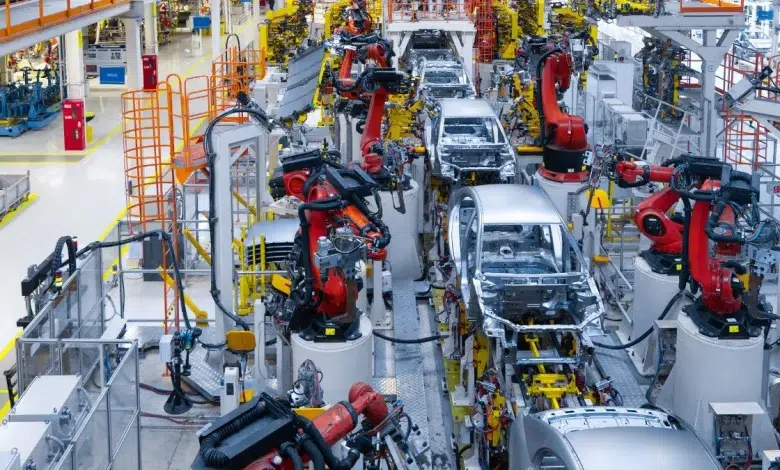Ford South Africa Retrenches 474 Workers Amid Backlash from NUMSA Union

Table of contents
- Industrial Storm: Job Cuts Hit South Africa’s Auto Sector
- NUMSA’s Strong Criticism of Ford’s Decision
- What is NUMSA?
- NUMSA’s Role and Activities
- Leadership and Influence
- NUMSA in the Ford Retrenchment Context
- Scale and Location of Retrenchments
- Economic and Social Implications
- Ford’s Response and Engagement
- The Call for Unity and Vigilance
- A Critical Juncture for South Africa’s Manufacturing Sector
Industrial Storm: Job Cuts Hit South Africa’s Auto Sector
Ford Motor Company of Southern Africa (FMCSA) has ignited controversy with plans to retrench 474 workers across its two major manufacturing plants. The announcement, made via a formal Section 189(3) notice under the Labour Relations Act in late August 2025, signals a challenging period for the country’s automotive industry. This also affects the broader industrial landscape. This move has sparked strong opposition and public concern.
RELEVANT ARTICLE: Ford SA Announces Job Cuts in Gqeberha and Pretoria
NUMSA’s Strong Criticism of Ford’s Decision
The National Union of Metalworkers of South Africa (NUMSA) has vocally condemned Ford’s retrenchment plans. General Secretary Irvin Jim characterised the cuts as “an attack on the South African working class.” NUMSA views these retrenchments as part of a broader trend of de-industrialisation. They believe economic mismanagement threatens jobs and livelihoods in the manufacturing sector. The union insists on urgent consultations and the exploration of alternatives to preserve employment.
What is NUMSA?
The National Union of Metalworkers of South Africa (NUMSA) is the largest metalworkers’ trade union in South Africa. It represents over 339,000 members working in industries such as automotive, mining, and metal manufacturing. Founded in 1987 through the merger of several older unions, NUMSA operates independently. It serves as a strong voice for labour rights and worker welfare.
NUMSA’s Role and Activities
NUMSA advocates for fair wages, safe working conditions, and job security for its members. The union often engages in collective bargaining and industrial actions to protect workers from unfair job losses. They also tackle economic challenges separately. Beyond labour issues, NUMSA campaigns for social and economic justice. It emphasises workers’ empowerment and pushes for policies addressing poverty and inequality.
Leadership and Influence
Under the leadership of General Secretary Irvin Jim, NUMSA is known for its outspoken criticism of government and corporate decisions. These decisions are often seen as negative for the working class. The union actively challenges practices perceived as harmful to workers’ rights and livelihoods.
NUMSA in the Ford Retrenchment Context
In response to Ford South Africa’s planned retrenchments, NUMSA has positioned itself as the workers’ representative body. The union calls for urgent consultations with Ford to explore alternatives to job cuts. NUMSA’s mandate is to ensure that workers receive fair treatment and transparency. They also ensure that labour laws are respected throughout the retrenchment process. The union aims to defend the jobs and livelihoods of the affected employees. They seek to mitigate the broader economic impact.
Scale and Location of Retrenchments
There was the R21-billion investment over the past five years in automation and advanced manufacturing that has fundamentally altered labour requirements. When you spend more than a billion dollars on robots and automated systems, you inevitably need fewer human hands on the production line. This is the “productivity dividend” that modern manufacturing demands — capital substituting for labour to remain globally competitive.
Ford’s restructuring will impact 391 employees at the Silverton assembly plant in Tshwane. It will also affect 73 workers at the Struandale engine plant in Gqeberha and 10 administrative staff across both sites. In addition, 141 fixed-term contract positions are slated for discontinuation by December 2025.
“We see this announcement as possibly the beginning of greater job losses facing the entire automotive industry in South Africa,” said Willie Venter, deputy general secretary of Solidarity.
Economic and Social Implications
NUMSA warns that retrenchments of this magnitude will exacerbate poverty, inequality, and social instability in an already fragile economy. The union criticises government policies perceived as inadequate. These policies fail to protect local industry and workers from the pressures of global market shifts and multinational corporate decisions. The possible ripple effects on related industries compound fears of a deepening industrial crisis.
Ford’s Response and Engagement
Ford acknowledges the difficulty of the decision, citing the need to realign manufacturing operations with current and forecasted demand. The company emphasises its commitment to lawful, ethical consultation processes with unions and affected employees. Company spokesperson Duduzile Nxele expressed regret over job losses. They pledged support for those impacted through available company programs and transitional assistance.
The Call for Unity and Vigilance
NUMSA is rallying workers to remain organised and to engage actively through trade union structures. It urges for swift government intervention and tighter industrial policy frameworks to safeguard jobs and stimulate growth. The union highlights that retrenchments should be the last resort after all alternatives have been fully explored.
A Critical Juncture for South Africa’s Manufacturing Sector
The Ford retrenchment marks a pivotal moment illustrating the challenges facing South Africa’s industrial base. The unfolding Section 189 process underscores the urgent need for comprehensive strategies addressing economic resilience and job preservation. Such strategies also focus on fair labour practices. For workers, unions, and policymakers alike, the situation demands robust dialogue and innovative solutions to protect livelihoods and secure the future of manufacturing in South Africa.



